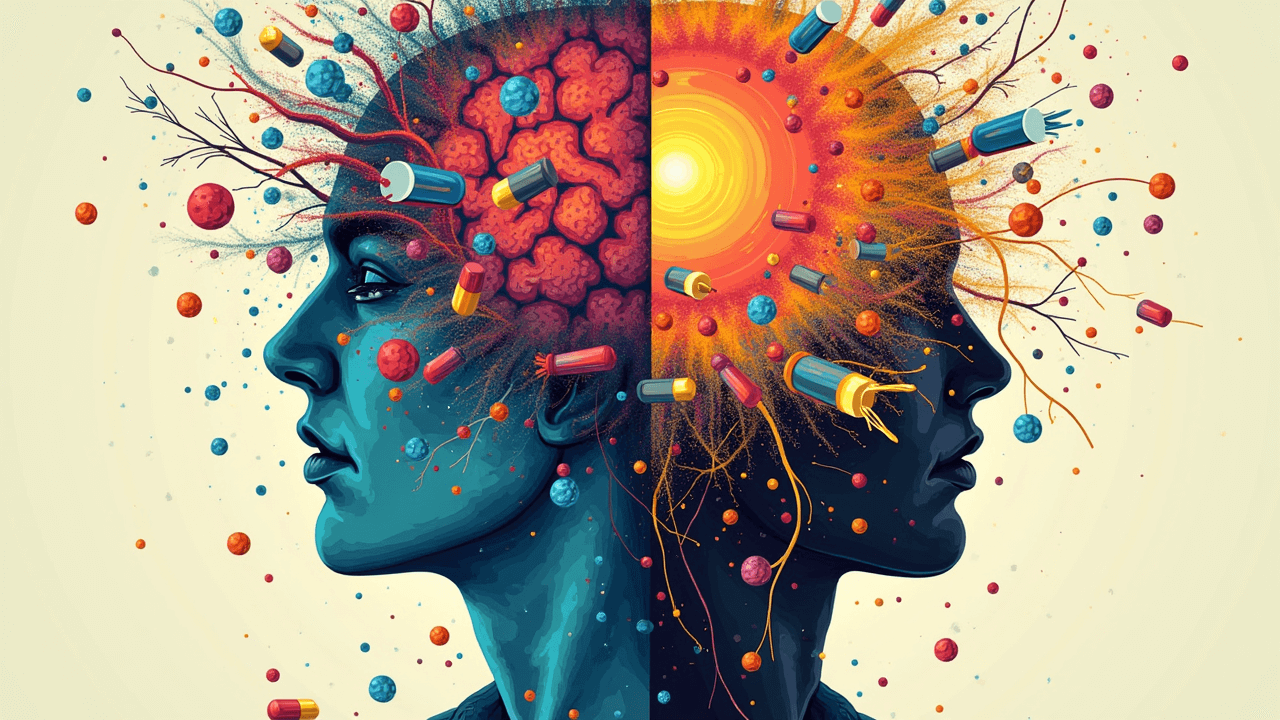Ever find yourself staring at a wall instead of that deadline you know, like suddenly reorganizing your sock drawer is way more appealing than that report that’s due tomorrow? Oh yeah, yeah, we’ve all been there. Focus. It’s a fickle friend, isn’t it?
Today, we’re taking a deep dive into how our brains grapple with focus, especially in the age of Adderall and this rising tide of ADHD diagnoses. What’s intriguing is how often we kind of chalk up focus to simply being on or off when it’s way more complex than that, right? It’s not a light switch, that’s for sure.
Understanding Focus and ADHD
You know where we’re getting these insights. There’s a fascinating discussion where people break down how Adderall works, especially for those with ADHD. And let me tell you, some of these explanations are gold. It’s a real treasure trove of personal experiences and aha moments. It highlights just how important it is to go beyond the clinical definitions and actually hear how people really experience these things.
One person described the ADHD brain as this insatiable stimulation-seeking machine, making everyday tasks not exactly a rave for those neurons. Almost like some brains crave novelty and stimulation more than others, exactly. So what happens when they’re stuck in a rut, distraction city? It’s like your brain is saying, “Nope, not doing the spreadsheet. I’m gonna go find me some dopamine.”
The Connection Between Smoking and ADHD
Which brings us to the fascinating world of self-medication and a rather smoky theory proposed by one user. This idea suggests that the decline in smoking we’ve seen over the past few decades could actually be related to the rise in ADHD diagnoses. Whoa, like, really? If fewer people are smoking now, could that be connected to more people being diagnosed with ADHD?
The really interesting thought, isn’t it? Because when you think about it, nicotine, even though it’s super harmful, definitely not endorsing, it does something very specific in the brain, right? It messes with your dopamine, super addictive, right? And what we’re seeing is a bunch of people sharing their own experiences with how smoking or nicotine actually helped them focus back in the day.
One person even mentioned that after quitting smoking in college, things went downhill, only to find out years later that ADHD was the culprit all along. It’s wild, right? Like your brain figures out a way to self-medicate before you even know what’s going on. It speaks to something really important: the way we experience our own neurochemistry, how it feels, can sometimes be our first clue.
Of course, it’s not always as straightforward as a smoking story. Another user shared how they used to drink coffee all day just to feel like they could function. Turns out they, too, got diagnosed with ADHD later on. So interesting. It’s like our bodies are trying to send us signals, but we don’t always have the right decoder ring to understand them, you know?
The Evolution of ADHD Diagnosis
And look, it’s not like smoking or downing coffee is the solution here, but it makes you think about how people were coping before we had the language and understanding of ADHD that we do now. We also have to remember that the way we diagnose and talk about ADHD has changed massively, especially for women. So that perceived rise in cases could be due to a bunch of factors, not just some mysterious link to smoking. But it is a good reminder that the way we understand mental health is constantly evolving, absolutely.
How Adderall Helps
This actually brings us back to Adderall because, in many ways, it’s like the flip side of that self-medication coin. Okay, let’s unpack that, because we have all these anecdotal experiences, right? But how does Adderall actually work in the brain, especially for someone with ADHD?
Well, put simply, Adderall basically helps the ADHD brain function more like a neurotypical brain. If we dig a little deeper, what’s happening is that Adderall is affecting those key messengers in your brain, those neurotransmitters we talked about earlier, especially dopamine and norepinephrine.
What Does Norepinephrine Do?
And just a quick reminder for our readers who aren’t walking neuroscience dictionaries: what exactly is norepinephrine up to in this whole brain party?
Good point. Norepinephrine is another neurotransmitter like dopamine, but it’s more involved in things like alertness, focus, and even our stress response. Yeah, that feeling of your heart racing when you’re about to give a presentation? Oh, yeah. So, is Adderall like hitting the boost button on both dopamine and norepinephrine?
The Boost of Adderall
That’s a great way to put it. It’s like turning up the volume on those brain signals, making them louder and clearer, especially in areas related to impulse control, attention, and emotional regulation. One user made a comparison that I really like. They said that Adderall is like glasses for nearsightedness. It’s not that it cures the underlying difference in how the brain is wired, but it helps you see the world more clearly and function more effectively in it.
Okay, I love that. Glasses for the ADHD brain. So we’re basically leveling the playing field, neurochemically speaking, totally.
Hunter vs. Farmer Brains
Speaking of leveling the playing field, there’s a super interesting analogy that I think our readers will appreciate. It’s about Hunter brains versus Farmer brains. Ah, yes, a brilliant comparison. You know, it really makes you think about how different brains might be wired for different environments, right?
What exactly are we talking about with these Hunter and Farmer brains?
Well, imagine our hunter-gatherer ancestors. They had to be constantly alert, scanning their surroundings for prey, for danger, always ready to react. Their brains were wired for that kind of world, for quick thinking and adaptability. And then you have the farmer brain, which thrives on routine, on sustained attention to a single task, like cultivating crops.
Implications in the Modern World
So two totally different operating systems running in our heads. And I’m guessing this analogy is about more than just our ancient ancestors, right?
Exactly. It gets really interesting when we think about how this plays out in our modern world. Many of our systems, especially things like the traditional school system, are very much designed for farmer brains. It makes total sense: sitting still, focusing on one thing for hours on end. That’s a farmer brain’s paradise, but maybe not so much for our hunter brain friends, precisely. And that’s why this analogy is so powerful. It makes you realize that what might look like a deficit in one context, like an inability to sit still in a classroom, might actually be a strength in another. It’s about recognizing and valuing neurodiversity.
Creating Space for Neurodiversity
So if our world is increasingly designed for farmer brains, how do we create space for the hunters among us to thrive? That’s something I’m left pondering after this deep dive. It’s a crucial question, and I think it starts with awareness, with understanding that there’s no one size fits all approach to focus, attention, or even success.
Adderall for Those Without ADHD
This actually brings us to another question that popped up in the discussion, one that I’m sure many people have wondered about: What about folks without ADHD who take Adderall? Does it work the same way?
It’s a really important distinction to make because, as someone pointed out, the way Adderall affects neurotransmitters is consistent. It doesn’t know if you have an ADHD diagnosis or not. But another crucial point was brought up: for someone without ADHD, taking Adderall is essentially performance enhancement. It’s like giving your brain a temporary boost, but it doesn’t address an underlying difference in brain wiring. They even compare it to athletes using steroids, right? Like effective in the short term, maybe, but with potential ethical concerns and risks, exactly.
The Ethics and Risks of Adderall
And this is where it becomes less about the science and more about the ethics of cognitive enhancement. Plus, we can’t forget that Adderall, like any medication, comes with potential side effects and risks, including addiction. So definitely not something to be taken lightly.
Seeking Professional Help
It seems like the general consensus is, if you’re concerned about focus or attention, talk to a medical professional. Absolutely, they can help determine the root cause of those struggles and figure out the best course of action, whether that’s therapy, medication, lifestyle changes, or a combination of approaches.
Frequently Asked Questions
What is ADHD and how does it affect focus?
ADHD, or Attention-Deficit/Hyperactivity Disorder, affects how the brain processes focus and attention. People with ADHD may find it challenging to concentrate on tasks, leading to difficulties in work or daily activities.
How does Adderall help individuals with ADHD?
Adderall helps individuals with ADHD by increasing the levels of neurotransmitters like dopamine and norepinephrine in the brain. This enhances focus, attention, and impulse control, making it easier to function in everyday tasks.
Can people without ADHD benefit from taking Adderall?
While Adderall can provide a temporary boost in focus and performance, it does not address underlying differences in brain wiring for those without ADHD. It also carries risks such as addiction and ethical concerns regarding cognitive enhancement.
What are Hunter and Farmer brains?
Hunter and Farmer brains are analogies used to describe different cognitive styles. Hunter brains are wired for quick thinking and adaptability, suited for environments requiring constant alertness. Farmer brains thrive on routine and sustained attention to single tasks, fitting well with structured environments.
Why are ADHD diagnoses increasing?
ADHD diagnoses are increasing due to a combination of factors, including better understanding and recognition of the disorder, changes in diagnostic criteria, and increased awareness, especially among women. It’s not solely linked to external factors like smoking rates.
Your Hosts

Alex & Maria
Join Alex Thompson and Maria Davis as they navigate the fascinating world of knowledge. With their combined expertise and passion for learning, they simplify the complex and make every episode a journey worth taking.

